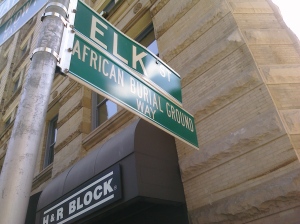The global tumult of the last week—the killing of the U.S. ambassador to Libya and global unrest stemming, allegedly, from disgust with a video about Muslims made by a film maker in the United States—makes the celebration of the U.S. Constitution just a little more poignant. Travel, for me, has always made history lessons come alive. So, of course I would be interested in the 225th anniversary of the Constitution’s signing.
I’m probably a bit more familiar with this document than most given my background as a political science major, my schooling in Washington, D.C., and my legal training. The First Amendment is probably my favorite, one I’m likely to quote: “Congress shall make no law respecting an establishment of religion, or prohibiting the free exercise thereof; or abridging the freedom of speech, or of the press; or the right of the people peaceably to assemble, and to petition the Government for a redress of grievances.” The 21st was an often-cited one back in my college years (it repealed Prohibition), and I found the 19th Amendment to be personally beneficial, saddened as I was by the fact that it was 1920 before women got the right to vote.
Anyone interested in America at the outset would do well to visit the National Archives in Washington, D.C., or Philadelphia, where the Constitutional Convention was held.
But the document signed 225 years ago this week—on Sept. 17, 1787—contained some unfortunate provisions, most notably this one: “Representatives and direct Taxes shall be apportioned among the several States which may be included within this Union, according to their respective Numbers, which shall be determined by adding to the whole Number of free Persons, including those bound to Service for a Term of Years,and excluding Indians not taxed, three fifths of all other Persons.” Slaves were deemed less than a person.
In the wake of the Civil War, those words in Article I were altered by the 13th amendment, which abolished slavery, and the 14th, which afforded equal protection of the laws to all U.S. citizens. Many seem to want to forget that the whole slavery episode—spanning hundreds of years and predating the existence of this nation—even happened.
On a trip to Colonial Williamsburg in Virginia, a tour guide referred repeatedly to servants helping in the governor’s palace. A pointed question got him to concede that those servants were either indentured or slaves. At George Washington’s Mount Vernon estate (plantation may be a more appropriate description), I was surprised to see just one small house that slaves lived in (besides slave quarters nearer the mansion). The fields of Mount Vernon surely were tended by more than a few slave families. I would have preferred more acknowledgement of slavery’s role in supporting this Founding Father.
Even farther north, tour guides have seemed reticent to acknowledge this dark part of our country’s past. Enthused by the news that Philipsburg Manor was incorporating elements of slavery’s history in its exhibitions and activities, I mentioned this to a man selling maps of Sleepy Hollow Cemetery, just across the street. “Oh, there were no slaves there,” he snipped. Really? Who tended the farm?
Visits to some of these sites with their revisionist history have angered me sometimes. I was glad to have gotten a dose of the truth on a walking tour of lower Manhattan when I visited the African Burial Ground, where the bodies of free blacks and slaves in New York City were buried from the 1690s to the 1790s. I am hopeful that slavery’s role in the history of the United States will be more openly acknowledged. In the meantime, I’ll appreciate the Constitution, especially certain updates, and the progress some tourist destinations are making, however slowly.
© Lori Tripoli, 2012




[…] Are Historical Slights Honest about Slavery? […]
[…] A Visit to the African Burial Ground […]
[…] New York City: African Burial Ground […]
[…] A Visit to the African Burial Ground […]
[…] A Visit to the African Burial Ground in Manhattan […]
[…] appreciate most the exhibit’s discussion of cotton, which mentions the use of slave labor in the United States. Some unfortunate decisions the British Empire made after overtaking India also are covered. Even […]